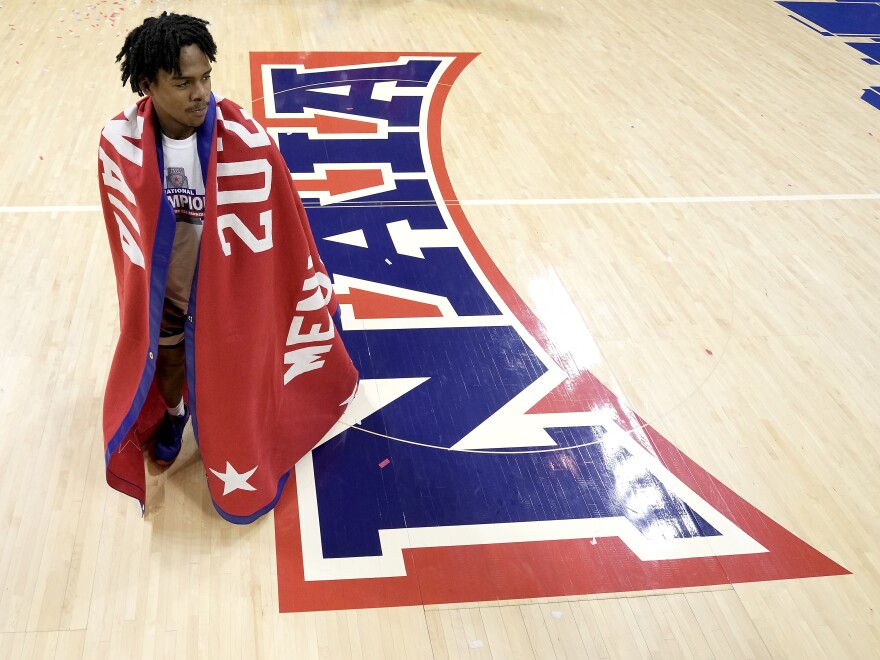The National Association of Intercollegiate Athletics announced a policy Monday that all but bans transgender athletes from competing in women's sports at its 241 mostly small colleges across the country.
The NAIA Council of Presidents approved the policy in a 20-0 vote at its annual convention in Kansas City, Missouri. The NAIA, which oversees some 83,000 athletes competing in more than 25 sports, is believed to be the first college sports organization to take such a step.
According to the transgender participation policy, all athletes may participate in NAIA-sponsored male sports but only athletes whose biological sex assigned at birth is female and have not begun hormone therapy will be allowed participate in women's sports.
A student who has begun hormone therapy may participate in activities such as workouts, practices and team activities, but not in interscholastic competition.
"With the exception of competitive cheer and competitive dance, the NAIA created separate categories for male and female participants," the NAIA said. "Each NAIA sport includes some combination of strength, speed and stamina, providing competitive advantages for male student-athletes. As a result, the NAIA policy for transgender student-athletes applies to all sports except for competitive cheer and competitive dance, which are open to all students."
There is no known number of transgender athletes at the high school and college levels, though it is believed to be small. The topic has nonetheless become a hot-button issue among conservative groups and others who believe transgender athletes should not be allowed to compete on girls' and women's sports teams.
"The NAIA understands that legal action being taken to challenge the policy is a possibility, but this policy is one our membership and board felt like was the right decision," the NAIA said in a statement to The Associated Press.
Shiwali Patel, senior counsel at the National Women's Law Center, said her organization was outraged by the NAIA policy.
"This is unacceptable and blatant discrimination that not only harms trans, nonbinary and intersex individuals, but limits the potential of all athletes," Patel said in a statement. "It's important to recognize that these discriminatory policies don't enhance fairness in competition. Instead, they send a message of exclusion and reinforce dangerous stereotypes that harm all women."
Last month, more than a dozen current and former college athletes filed a federal lawsuit against the NCAA, accusing the sports governing body for more than 500,000 athletes of violating their rights by allowing transgender women to compete in women's sports.
Hours after the NAIA announcement, the NCAA released a statement: "College sports are the premier stage for women's sports in America and the NCAA will continue to promote Title IX, make unprecedented investments in women's sports and ensure fair competition for all student-athletes in all NCAA championships."
At least 24 states have laws barring transgender women and girls from competing in certain women's or girls sports competitions.
The Biden administration originally planned to release a new federal Title IX rule — the law forbids discrimination based on sex in education — addressing both campus sexual assault and transgender athletes. Earlier this year, the department decided to split them into separate rules, and the athletics rule now remains in limbo even as the sexual assault policy moves forward.
Patel said the NAIA ban, along with the state laws, "emphasizes the urgency in having clear Title IX rules that expressly prohibit this type of sex-based discrimination, and ensure the rights of all students, including transgender, nonbinary, and intersex athletes, are safeguarded. Trans athletes deserve a chance to play."
The NCAA has had a policy for transgender athlete participation in place since 2010, which called for one year of testosterone suppression treatment and documented testosterone levels submitted before championship competitions.
In 2022, the NCAA revised its policies on transgender athlete participation in an attempt to align with national sport governing bodies, following the lead of the U.S. Olympic and Paralympic Committee.
The three-phase implementation of the policy included a continuation of the 2010 policy, requiring transgender women to be on hormone replacement therapy for at least one year, plus the submission of a hormone-level test before the start of both the regular season and championship events.
The third phase adds national and international sport governing body standards to the NCAA's policy and — after a delay — is scheduled to be implemented for the 2024-25 school year on Aug. 1.
There are some 15.3 million public high school students in the United States and a 2019 study by the CDC estimated 1.8% of them — about 275,000 — are transgender. The number of athletes within that group is much smaller; a 2017 survey by Human Rights Campaign suggested fewer than 15% of all transgender boys and transgender girls play sports.
The number of NAIA transgender athletes would be far smaller.
Copyright 2024 NPR. To see more, visit https://www.npr.org.







